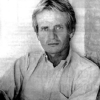Bruce Chatwin

Bruce Chatwin
Charles Bruce Chatwinwas an English travel writer, novelist, and journalist. His first book, In Patagonia, established Chatwin as a travel writer, although he considered himself instead a storyteller, interested in bringing to light unusual tales. He won the James Tait Black Memorial Prize for his novel On the Black Hilland his novel Utzwas shortlisted for the Man Booker Prize. In 2008 The Times named Chatwin #46 on their list of "50 Greatest British Writers Since 1945."...
NationalityEnglish
ProfessionNovelist
Date of Birth13 May 1940